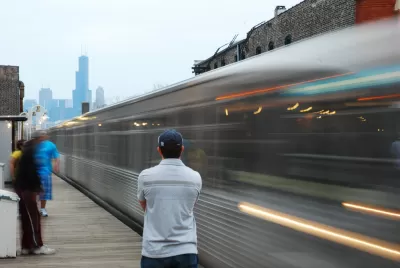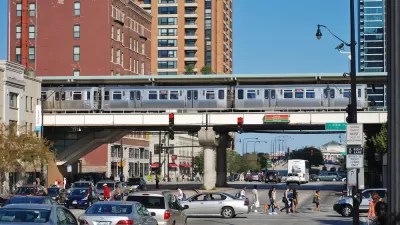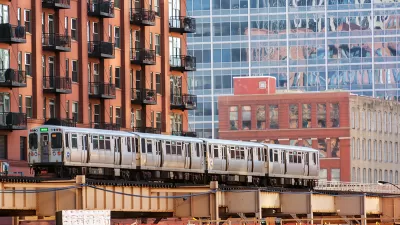This month, the city of Chicago will choose a team of engineers to brainstorm an express rail line to O'Hare Airport. The plan has come under criticism for diverting future resources away from transit in low-income areas.

Chicago is considering an express train from downtown to O'Hare Airport, even though the CTA Blue Line already serves the route. This month, John Greenfield and Steven Vance report, "the aviation department will pick an engineering team to analyze and develop conceptual designs for the rail service and lay out an overall timeline for the project."
The plan hasn't been popular with everyone. "With Emanuel under attack for multiple police scandals and the Chicago Public Schools financial crisis, it seems like an odd time to move forward with a plan that would largely benefit the well heeled folks who'd be willing to pay a premium for a faster ride to the airport." The city is considering public-private options to finance the project instead of public funds.
The article also discusses CrossRail, an alternate plan to use Chicago Metra tracks instead of CTA ones for the express line. "There's no cost estimate for the project yet, but a business plan for the airport express created for the CTA in 2006 estimated that a Blue Line-parallel service with separate tracks would cost $1.5 billion."
FULL STORY: City Will Select Engineering Team Next Month to Brainstorm O’Hare Express

Manufactured Crisis: Losing the Nation’s Largest Source of Unsubsidized Affordable Housing
Manufactured housing communities have long been an affordable housing option for millions of people living in the U.S., but that affordability is disappearing rapidly. How did we get here?

Americans May Be Stuck — But Why?
Americans are moving a lot less than they once did, and that is a problem. While Yoni Applebaum, in his highly-publicized article Stuck, gets the reasons badly wrong, it's still important to ask: why are we moving so much less than before?

Research Shows More Roads = More Driving
A national study shows, once again, that increasing road supply induces additional vehicle travel, particularly over the long run.

Judge Halts Enforcement of Anti-Homeless Laws in Grants Pass
The Oregon city will be barred from enforcing two ordinances that prosecute unhoused residents until it increases capacity and accessibility at designated camping sites.

Advancing Sustainability in Los Angeles County Schools
The Los Angeles County Office of Education’s Green Schools Symposium brings together educators, students, and experts to advance sustainability in schools through innovative design, climate resilience strategies, and collaborative learning.

Using Old Oil and Gas Wells for Green Energy Storage
Penn State researchers have found that repurposing abandoned oil and gas wells for geothermal-assisted compressed-air energy storage can boost efficiency, reduce environmental risks, and support clean energy and job transitions.
Urban Design for Planners 1: Software Tools
This six-course series explores essential urban design concepts using open source software and equips planners with the tools they need to participate fully in the urban design process.
Planning for Universal Design
Learn the tools for implementing Universal Design in planning regulations.
City of Moreno Valley
Institute for Housing and Urban Development Studies (IHS)
City of Grandview
Harvard GSD Executive Education
NYU Wagner Graduate School of Public Service
City of Cambridge, Maryland
Newport County Development Council: Connect Greater Newport





























